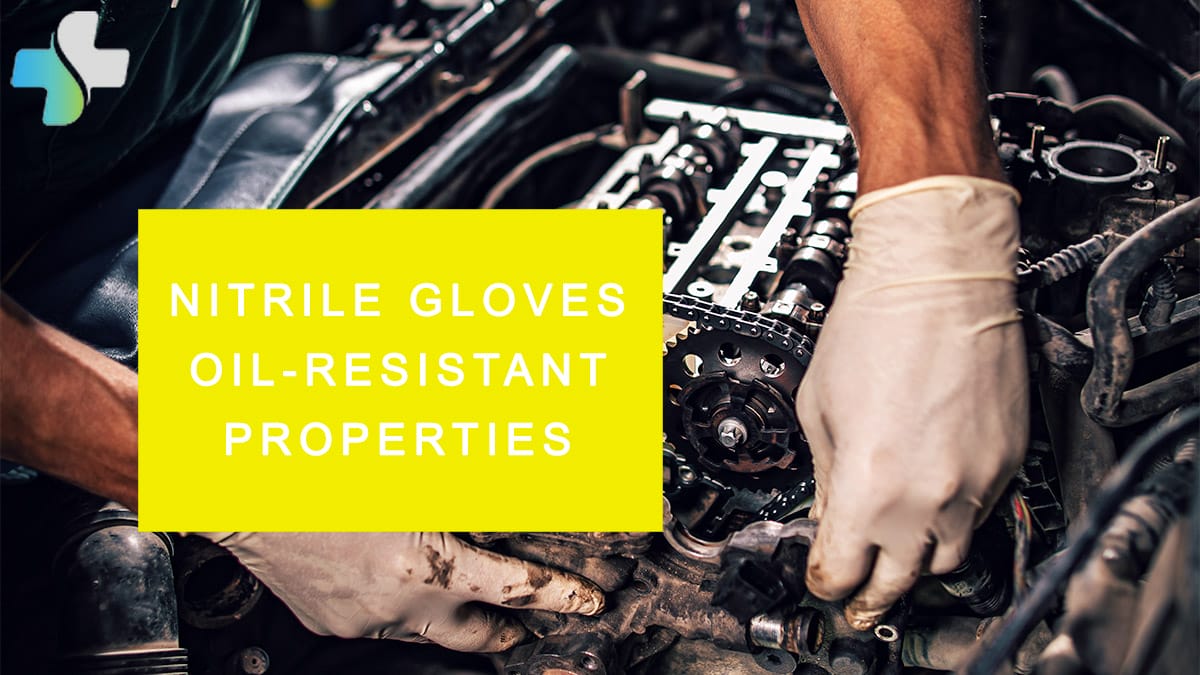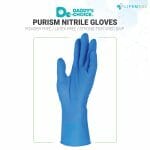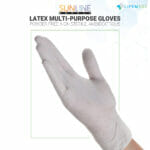Nitrile gloves, made from synthetic rubber, are known for their exceptional oil-resistant properties, making them highly valued PPE in various industries, mainly where oil and chemical exposure is a concern.
Exploring the Oil-Resistant Nature of Nitrile Gloves
In personal protective equipment (PPE) gloves, nitrile gloves have become a leading choice, especially in environments with prevalent oil and chemical exposure. Their exceptional oil-resistant properties, durability, and flexibility make them a go-to glove in various industrial, laboratory, and medical settings. Nitrile gloves are available in both disposable and reusable forms. Disposable gloves are intended for single-use applications, providing convenience for frequent glove changes and reducing the risk of contamination. Reusable gloves, conversely, are thicker and more durable gloves, suitable for tasks requiring prolonged exposure to oils and chemicals. Oil-resistant nitrile gloves focus on their chemical composition, manufacturing process, and the pivotal role of acrylonitrile.
Chemical Composition
Nitrile gloves are made from nitrile butadiene rubber (NBR), a synthetic material combining acrylonitrile and butadiene. This composition is key to their resistance to oils, fuels, and other chemicals. The higher the acrylonitrile content in NBR enhances the glove’s resistance to oils.
Oil Resistance Mechanism
Nitrile gloves are highly resistant to hydrocarbon oils, which are prevalent in the automotive industry and other industrial applications. This makes them suitable chemical-resistant gloves in industries handling greases, oils, and solvents. Nitrile’s low permeation rate with oil-based substances prevents oils from leaking through the glove material. Nitrile gloves maintain structural integrity by resisting deterioration when exposed to oils.
Manufacturing Process
In manufacturing, nitrile rubber undergoes a cross-linking process. This improves nitrile’s chemical resistance, contributing to the material’s ability to resist oil penetration. The manufacturing process authorizes changing the glove’s thickness, which can determine the level of protection against oils while improving dexterity.
Applications and Limitations
Nitrile gloves are versatile for painting, automotive work, cleaning, and industries with constant oil exposure. While highly resistant to oil, they are not entirely impenetrable, depending on the type of oil, exposure duration, and glove thickness. Nitrile gloves come in disposable and reusable forms. While reusable nitrile gloves are thicker and more durable for extended use, disposable nitrile gloves are handy for jobs requiring frequent glove changes.
Comparing Nitrile Gloves Oil Resistance with Other Types: Latex and Vinyl
Nitrile gloves’ oil-resistant nature results from their chemical makeup, specifically the acrylonitrile content in the NBR and their specialized manufacturing process. Their ability to resist oil concentration makes them a preferred choice in environments where oil exposure is hazardous. When comparing the oil resistance of nitrile gloves to other common glove types like latex and vinyl, it’s essential to understand each glove type’s distinct properties and applications.
Latex Gloves
Latex gloves are disposable gloves made from natural rubber latex. They are prone to degradation from oils and hydrocarbons. Their chemical resistance protects against specific biological hazards and water-based materials, not oil-based chemicals. Regarding durability, latex gloves are highly elastic and comfortable but not as puncture-resistant as nitrile. While they are known for their superior comfort and fit, latex is an allergen that can cause or trigger latex allergies and sensitivities.
Vinyl Gloves
Vinyl gloves are another disposable glove made from polyvinyl chloride (PVC) and plasticizers. They offer moderate resistance to oils- better than latex but not as good as nitrile. Vinyl material is less chemically resistant than nitrile, especially to solvents and other harsh chemicals. Vinyl gloves are the least durable and puncture-resistant of latex and nitrile.
Vinyl gloves offer a looser, more flexible fit than nitrile and latex gloves. Vinyl is also latex-free, making it a suitable glove option for people with latex allergies.
Nitrile Gloves
Nitrile is made from synthetic rubber, nitrile butadiene rubber (NBR). Out of all disposable gloves, nitrile gloves offer the best protection in environments where oil resistance is needed. Nitrile is resistant to oils, greases, and hydrocarbon-based chemicals, with superior resistance to a wide range of chemicals compared to latex and vinyl. They are generally more durable and puncture-resistant gloves out of the three. While they are less flexible than latex but more than vinyl, recent advancements have improved their comfort and flexibility. In addition to all the benefits of nitrile gloves, they are suitable for users with latex allergies and sensitivities.
The Role of Acrylonitrile in Improving Oil Resistance
Acrylonitrile is a critical component in nitrile butadiene rubber (NBR), as it strengthens the oil resistance of nitrile gloves. NBR, a synthetic copolymer, is created by blending acrylonitrile and butadiene in fluctuating portions, affecting the properties of the final product—nitrile gloves. The acrylonitrile content is particularly significant as the higher its percentage, the greater the glove’s resistance to oils and chemicals.
Gloves with a higher acrylonitrile content are more resistant to hydrocarbon oils commonly encountered in automotive and industrial environments. LifeMedz nitrile gloves are created with different acrylonitrile levels to address varying needs and create the perfect disposable gloves for various industries. These gloves balance oil resistance with the flexibility to cater to various industrial, medical, and laboratory applications.
Buying Oil Resistant Nitrile Gloves
Nitrile gloves are well-known for their oil-resistant properties due to their chemical composition and the performance of acrylonitrile. Their tailored manufacturing process further enhances these properties, making them a versatile and reliable choice in environments with oil and chemical exposure risks. While nitrile gloves offer superior protection in various situations and industries, understanding their limitations is critical to selecting the correct type of glove for specific applications. As the demand for preferred and effective personal protective equipment (PPE) continues to rise, nitrile gloves remain fundamental for protecting hands against oil-related hazards.
Buying oil-resistant personal protective equipment (PPE) gloves is swift and easy with LifeMedz. Our bulk nitrile gloves offer high performance, comfort, oil and chemical resistance, and lasting durability. Whether you’re looking to place a bulk order or a single order, our PPE options are catered to your health and safety needs!
Reference:
- Rado Rubber. Acrylonitrile-Butadiene Rubber.
- Occupational Safety and Health Administration. Personal Protective Equipment.


















